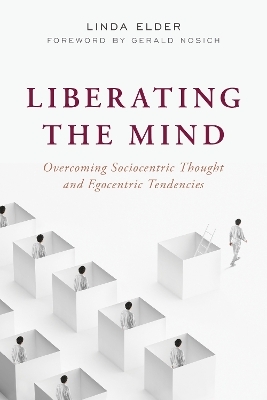
Liberating the Mind
Rowman & Littlefield Publishers (Verlag)
978-1-5381-7414-2 (ISBN)
Throughout history, thinkers within every part of society have been crippled by an ingrained bias toward their own views and the views of their preferred social groups. As these dangerous egocentric and sociocentric tendencies continue to pose the greatest threat to the advancement of rational societies, Liberating the Mind reveals a way forward.
Dissecting the core of how humans naturally learn, think, and choose to act, internationally recognized critical thinking leader Linda Elder illuminates root causes of dysfunctional thought and shows us how to free ourselves from both selfishness and groupthink through explicit tools of rationality. This instant intellectual classic offers a cohesive, integrated theory of mind that takes into account pathological tendencies shared by all humans, while offering a clear path toward the cultivation of fairminded critical thinking throughout the world. Elder illuminates how, by taking the intrinsic problems in our thinking seriously, we can follow the example of Socrates and live the examined life, even in times of upheaval and doubt.
Dr. Linda Elder is an educational psychologist and internationally recognized authority on critical thinking who has taught both psychology and critical thinking at the college level. She has been president of the Foundation for Critical Thinking and the executive director of the Center for Critical Thinking for 25 years. She has a special interest in the relation of thought and emotion, as well as the cognitive and affective and has developed an original theory of the stages of critical thinking development. Elder has coauthored four books on critical thinking, as well as all 23 titles found in the Thinker's Guide Library.
Foreword by Gerald Nosich
Preface
Chapter 1: The problem of Sociocentrism
Chapter 2: Manifestations of Sociocentric Thought in Human Societies
Chapter 3: Sociocentric Uses of Language
Chapter 4: Sociocentric Counterfeits of Ethical Reasoning
Chapter 5: Sociocentric Thinking and Egocentric Thinking in Interrelationship
Chapter 6: Envisioning Critical Societies
Afterword by Richard Paul
Appendix A: Some Basic Definition
Appendix B: The Logic of Sociocentric Thought
Praise for the book:
“In this bracing book, Linda Elder delineates the destructive power of in-group bias and the inability
to see the world from other points of view, smashing shibboleths along the way. The book offers
useful exercises to help readers think through their own preconceptions as well as those held by their
families, religions, and societies. A practical tool for those looking to free their minds.”
—Doug Merlino, author of The Hustle
‘Sociocentrism’ is a useful concept, embracing a host of ways in which we fail to give sufficient weight
to the interests of those beyond the borders of our own group - whether that group is family, ethnic or
religious group, or our own species. I hope this book will stimulate its readers to think critically about
their sociocentric prejudices.”
—Peter Singer, author, Writings on an Ethical Life and Animal Liberation
“How easy it is to see the corrosive effect of groupthink in others—over history or across borders.
Linda Elder wants more from us. She wants us to comprehend, in ourselves and in our own time, just
how much our fragile psyches are built of beliefs and opinions that have value only as signs of group
membership. Thinking for ourselves may be the most difficult and courageous thing that we can learn
to do. The Emancipated Mind is the best guide I’ve read on the topic.”
—Ethan Watters, Author of Crazy Like Us: The Globalization of the American Psyche
“Human beings are, above all, social animals. On the whole, this is a good thing, but it can also lead to
the kind of groupthink that poet William Blake called ‘mind-forged manacles.’ The Emancipated Mind
is a clarion call for independent thinking and critical analysis. Using compelling examples, Linda Elder
illuminates the perils of sociocentric thought.“
—Mark Pendergrast, author of Victims of Memory and other books
“Many people understand the drawbacks of egocentric thought. Less widely known, however, is the
downside at the other extreme: ‘sociocentric’ thought. Yet, as Linda Elder shows so clearly, excessive
group-orientation can dangerously deform our thoughts, our lives, our planet. Read The Emancipated
Mind and then reflect on how sociocentric thought (actually, a failure of thought) has influenced you
and those around you. When it comes to counteracting this insidious process, there is nothing better
than good, clean, honest, hard, serious and probing thought, and The Emancipated Mind is a superb
handbook for precisely this antidote.”
— David P. Barash, professor of psychology, University of Washington, and author, most recently,
of Homo mysterious: evolutionary mysteries of human nature
“The Emancipated Mind: Overcoming Sociocentric Thought, by Linda Elder, provides a detailed and
challenging review and examination of critical thinking, and serves as an effective guide toward
careful and productive thought. Various patterns and pitfalls of common cognitive practices are
evaluated. Abundant examples are given of human problems and failures resulting from actions
based on self-centered and group-centered thinking. Dr. Elder’s many quotations from notable
thinkers provide interest and color . . . Linda Elder has done it again. Her latest contribution is a very
worthwhile treatise on the importance of critical thinking. It will (and should) be widely distributed
and read.”
— Joseph Erwin, primatologist, editor and author of Captivity and Behavior
| Erscheinungsdatum | 15.10.2022 |
|---|---|
| Vorwort | Gerald Nosich |
| Verlagsort | Lanham, MD |
| Sprache | englisch |
| Maße | 152 x 228 mm |
| Gewicht | 404 g |
| Themenwelt | Sozialwissenschaften ► Kommunikation / Medien ► Kommunikationswissenschaft |
| Sozialwissenschaften ► Pädagogik | |
| Wirtschaft ► Betriebswirtschaft / Management ► Allgemeines / Lexika | |
| ISBN-10 | 1-5381-7414-6 / 1538174146 |
| ISBN-13 | 978-1-5381-7414-2 / 9781538174142 |
| Zustand | Neuware |
| Haben Sie eine Frage zum Produkt? |
aus dem Bereich


